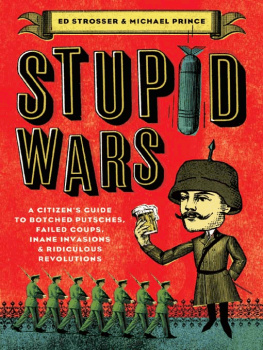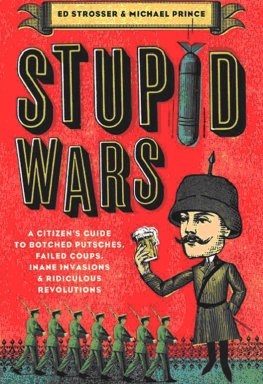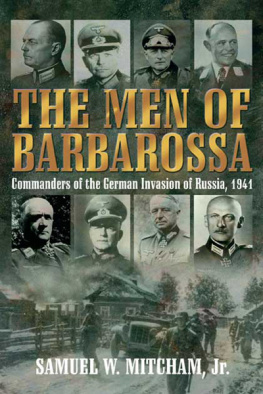A Citizens Guide to Botched Putsches, Failed Coups, Inane Invasions, and Ridiculous Revolutions
This book is dedicated to all the GIs, Tommies, poilus, and other dogfaces of the worlds armies who have suffered the mindless and generally fatal consequences of war.
W ars happen. Frequently. A quick survey of human history reveals only the briefest of periods where someone hasnt been shooting or hacking away at other humans. Periods of calm have been few and far between, and are usually reserved for planning the next conflict. Often as not, that planning is half-baked, off the mark, out of touch with reality, and potentially terminal for the planner. In some cases, this type of planning actually gets put into action. The results have not been pretty. A wise person once said, If you want to know the future, study the past. We salute that wisdom with our study of the most foolish military endeavors man has ever thrown his boundless energy and brilliance into.
A chronicle of mans dumbest conflicts represents history at its spiciest: utterly stupid, pointless, and morbidly curious collisions wheredriven blindly by greed, ignorance, ego, boredom, or some other incomprehensible credowe have committed and continue to commit mistakes on a grand scale. How can we not marvel at these individuals who gambled so recklessly with history itselfwith staggering costs in blood and treasurethat readers must shake their heads in disbelief while turning each page?
Most wars are bad. A very, very few seem to have actually been good. And then there are the conflicts that should never have been undertaken in the first place, that should have remained no more than the fevered little dreams of disturbed men. As any student of history knows, a smattering of these conflicts garner much of the attention. These are the good wars, such as World War II, which were fought for the right reasons and ended with a ringing moral victory. Library shelves groan with books about these rare but clear winners: the Greeks, the Romans, Napoleon, the British Empire, and the Allies in the two world wars. All winners. Because winners write history. And no one likes to give himself a bad review.
It is also extremely hard to write a book when youve been starved, shot, or marched to death, which is the fate of many war-losers. And there has always been a certain amount of shame in losing a war no matter how many of the enemy you may have vainly succeeded in shooting, stabbing, or bombing from an airplane. Therefore, in a historical Catch-22 we keep learning the lessons of historys winners, which is that winning wars is good.
As we delved into the martial history of our pugnacious little race, a few outstanding examples of really stupid wars leapt out. We limited ourselves to Europe and the Americas, although we are highly confident that Asia, Africa, Australia, and perhaps even the polar nether regions have also shared in the bounty of stupid wars.
Each stupid war offers useful lessons for the average citizen. Everyone needs to learn these lessons because the barriers of entry to politics, the army, or becoming a dictator are extremely low, and you may someday find yourself the head of a large country or army.
For example, if youve been handed the reins to a mighty empire such as the Roman only because your big brother is emperor, as happened to a young farmer named Valens, it is imperative that you first read the emperors handbook, especially the chapter on never, ever showing mercy to the barbarians clamoring to get in.
Or you might find yourself on a religious military expedition, such as the Fourth Crusade, in 1198. Consider skipping it entirely if it is launched under the specter of crushing debt, despite the obvious attractions of killing lots of Muslims and sacking Jerusalem for Christianity. The Fourth Crusade did just that and went seriously awry, as the debt-laden crusaders were forced to make a few unplanned stops and ended up sacking, raping, and pillaging Constantinople, the greatest city in Christendom. Oops.
As we studied the stupid wars, we discovered that there has been an understandable but dangerous tendency for politicians to play generaland vice versaand thus end up in very hot water. Even the most creative and visionary of politicians can fall prey to this danger. During the Whiskey Rebellion of 1794 in the infant United States, Secretary of the Treasury Alexander Hamilton (yes, the founding father with his face on the ten-dollar bill) headed up his own massive army to invade Pennsylvania to slap down some frontier settlers dodging Hamiltons tax on whiskey. In this stupid war against his own country, Hamilton clearly demonstrated the maxim that if you need to raise a huge army to force your democratic citizens to obey a tax law, you should seriously consider changing the law.
Dictators, sporting the zesty combo platter of unlimited political and unlimited military power, topped with unrestrained egomania, are usually the most egregious transgressors. For example, during the 186570 War of the Triple Alliance, Paraguay plunged into a war with three of its bigger, stronger, and richer neighbors, largely due to the warped decision of its dictator Francisco Solano Lpez to make his top military strategist the former Parisian whore he shared the palace with. The result was so bad that Lpez blamed his mother for the disastrous results, something not even Hitler was tempted to do.
Dictators also can make terrible allies as the Peruvians discovered during the War of the Pacific in 1879, when Bolivia started a war with Chile over birdshit, and dragged in Peru through a secret treaty to share their pain as its hapless ally. Peru was then forced to learn a basic lesson: when your ally drops out of the war, your army is destroyed, your leader has fled, your capital is occupied, an admiral is running your army, and your only source of wealth has been captured, its time to surrender. An important corollary for stupid wars was also established by the Bolivians during this affair: if you have a coastline you would like to defend, get a navy.
Even the most educated politicians can find themselves losing their bearings completely when surrounded by the fog of war. Bespectacled, smarty-pants President Woodrow Wilson ordered the invasion of newly Communist Russia in 1918 while World War I was still going on, but Wilson gave the general in charge explicit orders not to cause trouble. As the American general was soon to find out, if youre going to invade to overthrow a government, you should expect that the owners of the country youre invading may notice your presence, become upset, and try to shoot you.
The most brutal and devious dictators can even find themselves having trouble getting a stupid revolution up and running, let alone an entire war. During Hitlers 1923 Beer Hall Putsch the leaders of the Bavarian army, police, and government were practically begging for somebody to start a revolution and rescue them from the democracy that was rampant throughout Germany at the time. Hitler, with an all-star staff of evildoers that would later achieve stunning success in starting World War II, threw a coup that seemed like a cant-miss affair. But his clumsy attempt at grabbing power collapsed in less than a day, a grim reminder of the challenges of starting a coup from a cozy spot like a beer hall, especially in a country where most of the populace are highly armed war veterans.
Unfortunately for some countries, war making becomes an end in itself, a sure prescription for spectacularly stupid wars. The Chaco War between Bolivia and Paraguay in 1932 was just such a war. Each country vied to escape the losers bracket of history by beating the other loser. The result was one of the bloodiest wars, per capita, ever seen. They proved the maxim that even the champion of the losers bracket is a loser. Medals are not handed out for eightieth place.











